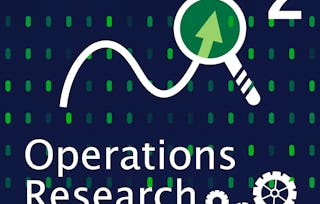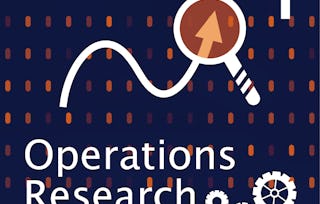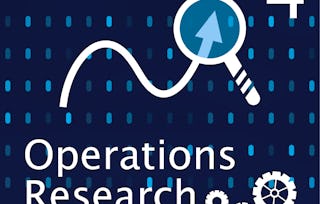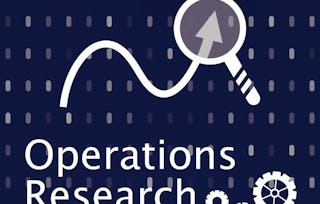Operations Research (OR) is a field in which people use mathematical and engineering methods to study optimization problems in Business and Management, Economics, Computer Science, Civil Engineering, Electrical Engineering, etc.

Operations Research (3): Theory

Operations Research (3): Theory
This course is part of Operations Research Specialization

Instructor: 孔令傑 (Ling-Chieh Kung)
11,941 already enrolled
Included with
95 reviews
Recommended experience
What you'll learn
Understand the theoretical properties of linear programs, integer programs, and nonlinear programs.
Apply the mathematical properties to reduce the complexity of real-world problems or to solve it.
Skills you'll gain
- Operations Research
- Case Studies
- Applied Machine Learning
- Business Analytics
- Advanced Mathematics
- Mathematical Modeling
- Network Model
- Applied Mathematics
- Algorithms
- Linear Algebra
- Transportation Operations
- Skills section collapsed. Showing 10 of 11 skills.
Details to know

Add to your LinkedIn profile
8 assignments
See how employees at top companies are mastering in-demand skills

Build your subject-matter expertise
- Learn new concepts from industry experts
- Gain a foundational understanding of a subject or tool
- Develop job-relevant skills with hands-on projects
- Earn a shareable career certificate

There are 8 modules in this course
In the first lecture, after introducing the course and the importance of mathematical properties, we study the matrix way to run the simplex method. Being more familiar with matrices will help us understand further lectures.
What's included
5 videos1 reading1 assignment
In this week, we study the theory and applications of linear programming duality. We introduce the properties possessed by primal-dual pairs, including weak duality, strong duality, complementary slackness, and how to construct a dual optimal solution given a primal optimal one. We also introduce one important application of linear programming duality: Using shadow prices to determine the most critical constraint in a linear program.
What's included
14 videos1 assignment
In the past two weeks, we study the simplex method and the duality. On top of them, the dual simplex method is discussed in this lecture. We apply it to one important issue in sensitivity analysis: evaluating a linear programming model with a new constraint. A linear programming model with a new variable is also discussed.
What's included
8 videos1 assignment
In this lecture, we introduce network flow models, which are widely used for making decision regarding transportation, logistics, inventory, project management, etc. We first introduce the minimum cost network flow (MCNF) model and show hot it is the generalization of many famous models, including assignment, transportation, transshipment, maximum flow, and shortest path. We also prove a very special property of MCNF, total unimodularity, and how it connects linear programming and integer programming.
What's included
11 videos1 assignment
As the last lesson of this course, we introduce a case of NEC Taiwan, which provides IT and network solutions including cloud computing, AI, IoT etc. Since maintaining all its service hubs is too costly, they plan to rearrange the locations of the hubs and reallocate the number of employees in each hub. An algorithm is included to solve the facility location problem faced by NEC Taiwan.
What's included
13 videos1 assignment
In this week, we study nonlinear programs with constraints. We introduce two major tools, Lagrangian relaxation and the KKT condition, for solving constrained nonlinear programs. We also see how linear programming duality is a special case of Lagrangian duality.
What's included
15 videos1 assignment
In this week, we introduce two well-known models constructed by applying the mathematical properties we have introduced. First, we formulate a simple linear regression problem as a nonlinear program and derive the closed-form regression formula. Second, we introduce support-vector machine, one of the most famous classification model, from the perspective of duality.
What's included
14 videos1 assignment
In the final week, we review the topics we have introduced and give some concluding remarks. We also provide some learning directions for advanced studies.
What's included
3 videos1 assignment
Earn a career certificate
Add this credential to your LinkedIn profile, resume, or CV. Share it on social media and in your performance review.
Instructor

Offered by
Explore more from Algorithms
 Status: Free Trial
Status: Free TrialNational Taiwan University
 Status: Free Trial
Status: Free TrialNational Taiwan University
 Status: Free Trial
Status: Free TrialNational Taiwan University
 Status: Free Trial
Status: Free TrialNational Taiwan University
Why people choose Coursera for their career

Felipe M.

Jennifer J.

Larry W.

Chaitanya A.
Learner reviews
- 5 stars
95.78%
- 4 stars
3.15%
- 3 stars
1.05%
- 2 stars
0%
- 1 star
0%
Showing 3 of 95
Reviewed on Apr 17, 2022
This is a good course. It provides necessary theoretical foundations.
Reviewed on Jan 2, 2025
Very involved and deatailed lectures for one of the complex topics in mathematics.
Reviewed on Jul 21, 2022
Very thorough and challenging for Operations Research candidates!

Open new doors with Coursera Plus
Unlimited access to 10,000+ world-class courses, hands-on projects, and job-ready certificate programs - all included in your subscription
Advance your career with an online degree
Earn a degree from world-class universities - 100% online
Join over 3,400 global companies that choose Coursera for Business
Upskill your employees to excel in the digital economy
Frequently asked questions
To access the course materials, assignments and to earn a Certificate, you will need to purchase the Certificate experience when you enroll in a course. You can try a Free Trial instead, or apply for Financial Aid. The course may offer 'Full Course, No Certificate' instead. This option lets you see all course materials, submit required assessments, and get a final grade. This also means that you will not be able to purchase a Certificate experience.
When you enroll in the course, you get access to all of the courses in the Specialization, and you earn a certificate when you complete the work. Your electronic Certificate will be added to your Accomplishments page - from there, you can print your Certificate or add it to your LinkedIn profile.
Yes. In select learning programs, you can apply for financial aid or a scholarship if you can’t afford the enrollment fee. If fin aid or scholarship is available for your learning program selection, you’ll find a link to apply on the description page.
More questions
Financial aid available,

